Unit 3 Topic 2 小测
仁爱版英语七年级unit3topic2
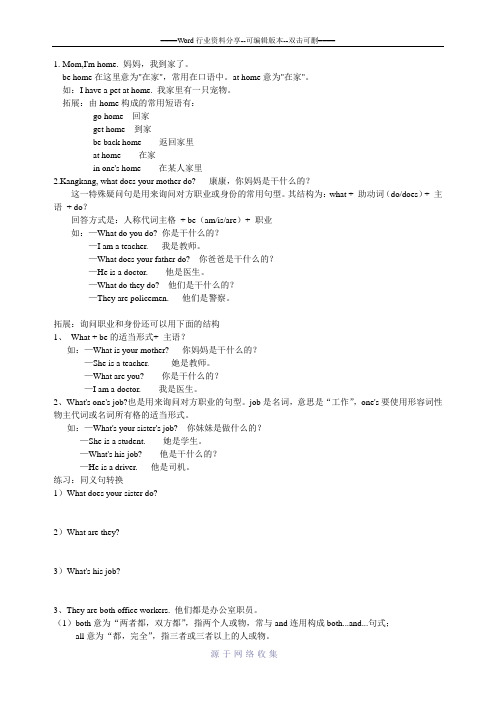
1.Mom,I'm home. 妈妈,我到家了。
be home在这里意为"在家",常用在口语中。
at home意为"在家"。
如:I have a pet at home. 我家里有一只宠物。
拓展:由home构成的常用短语有:go home 回家get home 到家be back home 返回家里at home 在家in one's home 在某人家里2.Kangkang, what does your mother do? 康康,你妈妈是干什么的?这一特殊疑问句是用来询问对方职业或身份的常用句型。
其结构为:what + 助动词(do/does)+ 主语+ do?回答方式是:人称代词主格+ be(am/is/are)+ 职业如:—What do you do? 你是干什么的?—I am a teacher. 我是教师。
—What does your father do? 你爸爸是干什么的?—He is a doctor. 他是医生。
—What do they do? 他们是干什么的?—They are policemen. 他们是警察。
拓展:询问职业和身份还可以用下面的结构1、What + be的适当形式+ 主语?如:—What is your mother? 你妈妈是干什么的?—She is a teacher. 她是教师。
—What are you? 你是干什么的?—I am a doctor. 我是医生。
2、What's one's job?也是用来询问对方职业的句型。
job是名词,意思是“工作”,one's要使用形容词性物主代词或名词所有格的适当形式。
如:—What's your sister's job? 你妹妹是做什么的?—She is a student. 她是学生。
—What's his job? 他是干什么的?—He is a driver. 他是司机。
仁爱版七年级英语上学期词句小测
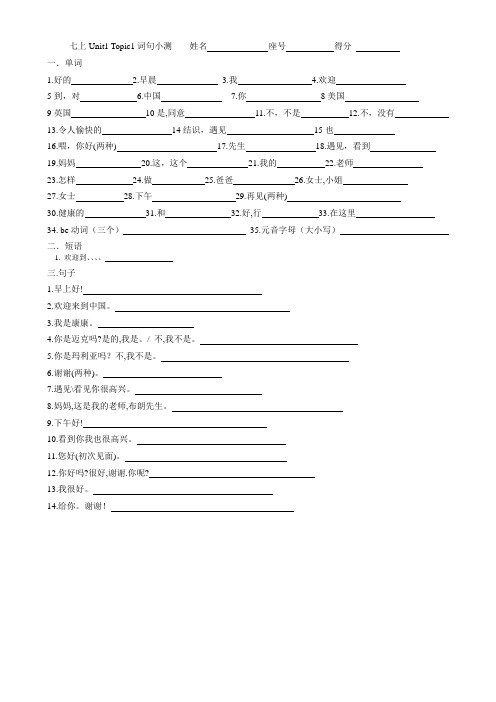
七上Unit1 Topic1词句小测姓名座号得分一.单词1.好的2.早晨3.我4.欢迎5到,对 6.中国7.你8美国9英国10是,同意11.不,不是12.不,没有13.令人愉快的14结识,遇见15也16.喂,你好(两种) 17.先生18.遇见,看到19.妈妈20.这,这个21.我的22.老师23.怎样24.做25.爸爸26.女士,小姐27.女士28.下午29.再见(两种)30.健康的31.和32.好,行33.在这里34. be动词(三个)35.元音字母(大小写)二.短语1. 欢迎到、、、、三.句子1.早上好!2.欢迎来到中国。
3.我是康康。
4.你是迈克吗?是的,我是。
/ 不,我不是。
5.你是玛利亚吗?不,我不是。
6.谢谢(两种)。
7.遇见\看见你很高兴。
8.妈妈,这是我的老师,布朗先生。
9.下午好!10.看到你我也很高兴。
11.您好(初次见面)。
12.你好吗?很好,谢谢.你呢?13.我很好。
14.给你。
谢谢!七上Unit 1 Topic 2词句小测姓名座号得分一单词1.原谅2.我3.什么4.你的,你们的5.名字6.请7.在哪里8来自9.加拿大10.美国11.日本12. 英格兰13. 他/她们14. 谁15. 古巴16.他17.她18.看起来19.电话20.号码21.它22.很,非常23.很,多少,许多24.那,那个25.她的26.家庭27.默写0-10二.短语1.来自2.全名3.姓,姓氏4.名,名字5.非常,很(短语)三.句子1.对不起,打扰了,你是简吗?是的,我是。
2.请问你叫什么名字?我叫Sally。
3.你来自哪里?我来自加拿大。
4.你也来自加拿大吗?不,我不是.我来自美国。
5.他们来自哪儿?6.他们来自英国吗? 是,是的。
/不,不是。
7.他们是谁?8他\她来自哪儿?他\她来自日本。
9看!她是谁?她是简。
10.她来自加拿大吗?是的,她是。
11看,康康!他是李明吗?不,他不是.他是Yukio。
七年级英语仁爱版上册Unit2_Topic3_同步梳理检测卷(原卷版)
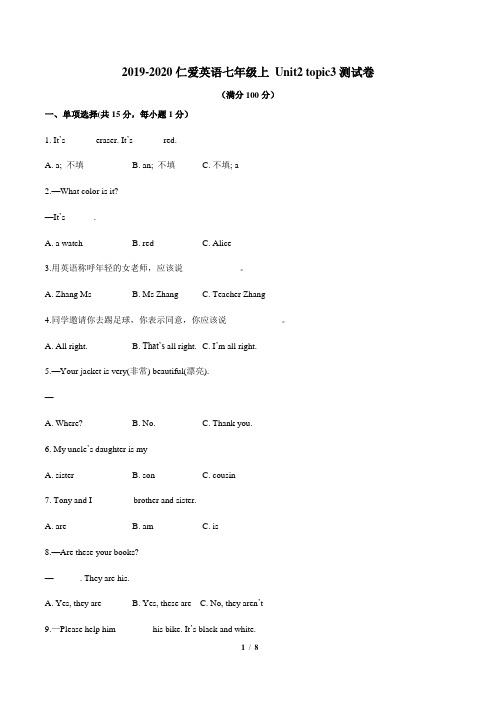
2019-2020仁爱英语七年级上Unit2 topic3测试卷(满分100分)一、单项选择(共15分,每小题1分)1. It’s ______ eraser. It’s ______ red.A. a; 不填B. an; 不填C. 不填; a2.—What color is it?—It’s ______.A. a watchB. redC. Alice3.用英语称呼年轻的女老师,应该说____________。
A. Zhang MsB. Ms ZhangC. Teacher Zhang4.同学邀请你去踢足球,你表示同意,你应该说 ____________。
A. All right.B. That’s all right.C. I’m all right.5.—Your jacket is very(非常) beautiful(漂亮).—____________A. Where?B. No.C. Thank you.6. My uncle’s daughter is myA. sisterB. sonC. cousin7. Tony and I_________ brother and sister.A. areB. amC. is8.—Are these your books?—______. They are his.A. Yes, they areB. Yes, these areC. No, they aren’t9.—Please help him________ his bike. It’s black and white.—0K, I’ll do it.A. wantB. findC. buy10.—Are Nancy and Helen sisters?A. AndB. ThenC. But11. This is Tom’s __________ and these are Tony’s __________.A. pen; rulerB. pens; rulerC. pen; rulers12.I have got some _______of New York.A. photoB. photosC. photoes13. --- _______ is this pair of glasses? --- I think they are our_______.A. Who; teacherB. Who; teacher’sC. Whose; teacher’s14.Please __________ the tree. Can you __________ any apples on it?A. look; seeB. look at; seeC. see; look15. Look ! That’s Nancy. She has big eyes.----- ____________.A. You’re right.B. That’s OK.C. You’re welcome.二、完形填空(共15分,每小题1.5分)Lily给Sandy写了一封电子邮件,介绍她的新学校和班级,选择适当的词将信补完整。
仁爱英语七年级上册Unit3_topic2知识点讲解及随堂练习

知识点梳理(一)单词1.职业名称teach (教) → teacher (教师) work (工作)→worker (工人) drive (驾驶)→driver (司机)farm (农场)→ farmer (农民) act(表演) →actor演员2. 对应词:teacher老师—student学生nurse护士—doctor医生waiter男服务员—waitress女服务员salesman 男售货员— salesgirl女售货员3. 家庭成员grandfather -- grandmother grandpa -- grandma father -- motherdad -- mum uncle --- aunt son--- daughter brother --- sister cousinin a school 在学校in a hospital 在医院in an office 在办公室in a shop / store 在商店on a farm 在农场at home 在家2.be home到家3. a photo of my family 一张我家的相片4.the young woman in yellow 穿黄衣服的年轻女士5. on the sofa 在沙发上6. a happy family 幸福的家7. a student in Grade Seven 一名七年级的学生8. live in…居住在9. live with…和……住在一起10. look after…照顾……;保管……(三)句型:1. I'm home. 我回来了.2. What a nice place! 多漂亮的一个地方!3. There are five people in my family.我家有五口人。
There be …“有……”,表示“某处有某人/物”,be动词的单复数形式根据所跟名词的单复数一致;people单复数同形。
仁爱英语九年级上册Unit3Topic2知识点
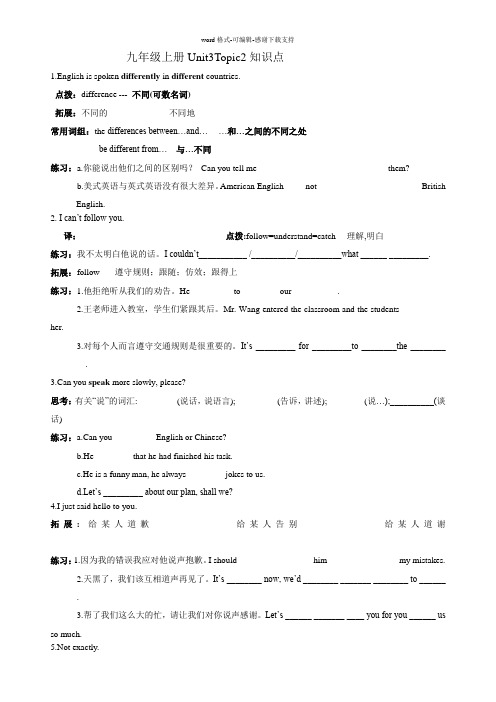
九年级上册Unit3Topic2知识点1.English is spoken differently in different countries.点拨:difference ---不同(可数名词)拓展:不同的_____________ 不同地______________常用词组:the differences between…and… ---…和…之间的不同之处be different from…---与…不同练习:a.你能说出他们之间的区别吗?Can you tell me _______ ____________ _________ them?b.美式英语与英式英语没有很大差异。
American English ____ not _______ __________ _____ BritishEnglish.2. I can’t follow you.译:_______________________________ 点拨:follow=understand=catch ---理解,明白练习:我不太明白他说的话。
I couldn’t___________ /__________/__________what ______ _________.拓展:follow --- 遵守规则;跟随;仿效;跟得上练习:1.他拒绝听从我们的劝告。
He _________ to ________ our __________.2.王老师进入教室,学生们紧跟其后。
Mr. Wang entered the classroom and the students __________ her.3.对每个人而言遵守交通规则是很重要的。
It’s _________ for _________to ________the ________ ________.3.Can you speak more slowly, please?思考:有关“说”的词汇:_________(说话,说语言); _________(告诉,讲述); ________(说…);__________(谈话)练习:a.Can you _________ English or Chinese?b.He ________ that he had finished his task.c.He is a funny man, he always ________ jokes to us.d.Let’s _________ about our plan, shall we?4.I just said hello to you.拓展: 给某人道歉__________________给某人告别__________________给某人道谢_____________________练习:1.因为我的错误我应对他说声抱歉。
八年级英语仁爱版上册_Unit3_Topic2_单元检测卷(原卷版)
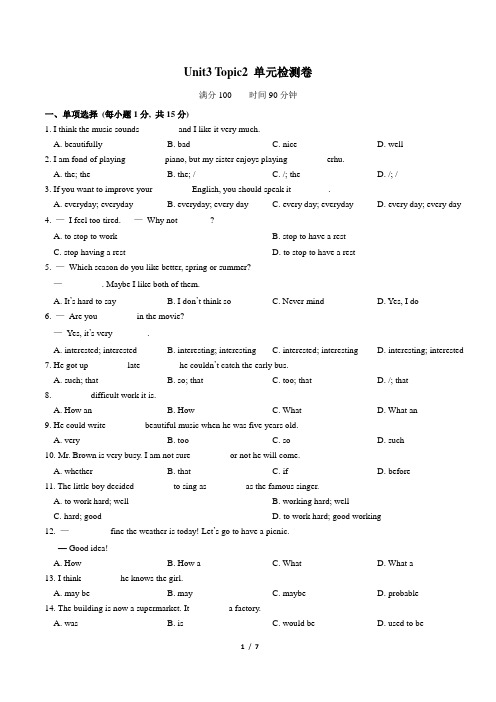
Unit3 Topic2 单元检测卷满分100 时间90分钟一、单项选择(每小题1分, 共15分)1. I think the music sounds ________ and I like it very much.A. beautifullyB. badC. niceD. well2. I am fond of playing ________ piano, but my sister enjoys playing ________ erhu.A. the; theB. the; /C. /; theD. /; /3. If you want to improve your ________ English, you should speak it ________.A. everyday; everydayB. everyday; every dayC. every day; everydayD. every day; every day4. —I feel too tired. —Why not _______?A. to stop to workB. stop to have a restC. stop having a restD. to stop to have a rest5. —Which season do you like better, spring or summer?—________. Maybe I like both of them.A. It’s hard to sayB. I don’t think soC. Never mindD. Yes, I do6. —Are you ________ in the movie?—Yes, it’s very________.A. interested; interestedB. interesting; interestingC. interested; interestingD. interesting; interested7. He got up ________ late ________ he couldn’t catch the early bus.A. such; thatB. so; thatC. too; thatD. /; that8. ________ difficult work it is.A. How anB. HowC. WhatD. What an9. He could write ________ beautiful music when he was five years old.A. veryB. tooC. soD. such10. Mr. Brown is very busy. I am not sure ________ or not he will come.A. whetherB. thatC. ifD. before11. The little boy decided ________ to sing as ________ as the famous singer.A. to work hard; wellB. working hard; wellC. hard; goodD. to work hard; good working12. —________ fine the weather is today! Let’s go to have a picnic.— Good idea!A. HowB. How aC. WhatD. What a13. I think ________ he knows the girl.A. may beB. mayC. maybeD. probable14. The building is now a supermarket. It ________ a factory.A. wasB. isC. would beD. used to be15. —My bike is broken. May I ________ yours?—Sorry, I ________ it to others.A. lend; lendB. borrow; lendC. borrow; borrowD. lend; borrow二、完形填空(每小题1分, 共10分)Once upon a time, there was a stone bird. She lived in a beautiful forest between 1 mountains. The bird was very heavy, so she could only walk on the 2 . But she enjoyed looking up at the trees every day. She dreamed one day she would be about to 3 and enjoy viewing the beautiful countryside from up high.But that 4 was gone after a great fire. In the forest, all the plants and animals were dead. The stone bird was the only form of life able to survive (幸存) the fire, but when she saw what the forest was like, she was 5 , and couldn’t stop crying. She cried and cried for hours, then days. She 6 with such feeling that her tears were wearing away her stone body. Finally the bird turned into a pool of 7 .But when the 8 came out, the pool of water flew into sky and became a happy little cloud. It could fly over the trees and 9 everything below.Since then, the little cloud traveled all over the world, enjoying the views of all the forests and beautiful countryside. And remembering what destruction (毁灭) the fire brought to its own forest, the cloud is now very careful to 10 its rain down on any tree it sees burning.1. A. two B. three C. four2. A. tree B. ground C. cloud3. A. walk B. run C. fly4. A. dream B. house C. animal5. A. angry B. sad C. excited6. A. laughed B. shook C. cried7. A. water B. air C. fire8. A. moon B. sun C. earth9. A. discover B. look C. see10. A. push B. pull C. pour三、阅读理解(每小题1分, 共20)(A)A girl told her mother that everything was going wrong for her; she always failed her math exam and shedidn’t like to study at all. After hearing the daughter’s words, the good mother wanted to find a good way to make her daughter happy. “I will make a delicious cake for you,” said the mother and she walked into the kitchen with her daughter.When the mother prepared the utensils (炊具) and ingredients (食材), the daughter sat across the counter, watching her mother.Her mother asked h er, “My dear, would you like a piece of cake?”The daughter answered, “Sure, Mom, you know I love cake very much!”“All right,” the mother said, “drink some of this cooking oil.”The daughter was very surprised and said. “What? No way!”“How about a coup o f raw (生的) eggs?” the daughter answered, “No way!”“How about some flour (面粉)?” “No, Mom, I will be sick!”The mot her said, “All of these are uncooked and taste bad, but if you put them together, they make a delicious cake. Life works the same way. When we ask ourselves why there are so many difficult times, we should know these events will go to success. So having a great day also means having a great CAKE!”1. From the passage, we know the girl is .A. a studentB. a nurseC. a teacherD. a cook2. The mother cooked the cake .A. in the living roomB. for herselfC. in the kitchenD. for her son3. At first, the mother let the girl .A. eat the cakeB. drink some cooking oilC. eat some raw eggsD. eat some flour4. Which of the following is NOT true about the girl?A. She was going through a hard time.B. She didn’t do well in her math exam.C. She was good at making cakes.D. She wasn’t interested in her study.5. The mother mainly wants to tell her daughter .A. the cake is very deliciousB. it’s difficult to make a cakeC. there are no difficult times in lifeD. she will go to the success with difficulties(B)Perhaps the most famous clothing company in the world, Levi Strauss & Co. was the inventor of blue denim jeans. Here’s how it happened.In the mid 1800s many people went to California to look for gold. A young German named Levi Strauss traveled to San Francisco to help his brother on business. He sold canvas (帆布) to the workers for tents. But the workers said they needed pants more, because their pants were easily worn out (穿破). Instead of selling his canvas for tent-making, he turned them into pants. These kinds of pants were very popular with workers. He was very happy and named the kind of pants “denim”. And in 1853 he founded Levi Strauss & Company.Twenty years later the company began using a design with pockets. During the working, Strauss developed the process for putting metal rivets (铆钉) in the “jeans” for strength.On May 20, 1873, they received Us Patent No. 139.121 for the process people consider that date the official birthday of “blue jeans”.Today the company still has its factories in San Francisco, California, over 11,000 people work in them and bring over $4 billion a year.1. Levi Strauss went to San Francisco .A. to look for goldB. to sell canvasC. to visit his brotherD. to help his brother on business2. The workers often complained .A. the canvas was not goodB. the work was too hardC. they couldn’t get enough foodD. their pants were not strong enough3. When did Levi Strauss & Company begin using a design with pockets?A. In 1800B. In 1820C. In 1853D. In 18734. The blue denim jeans have about years of history up to now.A. 100B. 130C. 140D. 2005. The passage mainly tells us .A. who invented jeansB. how people invented jeansC. when people invented jeansD. why jeans are so popular(C)Do you know how to play a game called “Musical Chairs”? It is easy to play and most people enjoy it. All you need are some chairs, some people and some way of making music. You may use a piano or any other musical instrument, if someone (有人)can play it. You may use a tape recorder(录音带). You can even use a radio(收音机).Put the chairs in a row. The chairs may be put in twos, back to back. A better way is to have the chairs in onerow with each chair facing in the opposite direction (相反的方向)to the chair next to it.The game is easy. When the music starts, the players walk round the chairs. Everyone goes in the same direction, of course, they should walk in time to the music. If the music is fast they should walk quickly. If the music is slow, they should walk slowly.The person playing music cannot see the people in the game. When the music stops, the players try to sit on the chairs. If a person cannot find a chair to sit on, he drops out. Then, before the music starts again, one chair must be taken away. When the music stops again, one more player will be out.At last, there will be two players and one chair. The one who sits on the chair when the music stops is the winner.1. I f ten people are playing “Musical Chairs”, you must begin with ___________.A. nine chairsB. ten chairsC. eleven chairsD. one chair2.. Which of the following is not proper for playing “Musical Chairs”?A. A piano.B. A radio.C. A tape recorder.D. A telephone.3.. The chairs should be put __________.A. in a lineB. with the desksC. before the winnerD. all over the room4.. When the music starts, the players must ___________.A. run about the roomB. get downC. walk around the chairsD. sit on the chairs5.. Which of the following is NOT true?A. The winner can sit on the chair.B. At last there will be two players and two chairs.C. If the person plays music, he cannot be the winner.D. The game “Musical Chairs” is not difficult to learn.四、看图写话(10分)1. not...at all2. play, spare3. hate, listen4. what, sweet!5.be going to, give, concert1.2.3.4.5.五、情景交际(10分)1. 你想问星期日晚上打算做什么﹕, ?2. 你说自己打算去听音乐会﹕3. 感叹多么甜美的音乐﹕4. 感叹多么令人遗憾﹕5. 你过去喜欢流行音乐﹕六、短文填词(共10小题, 每小题1分, 满分10分)Yesterday was Saturday. It’s Bob’s ___1___. He is six years old. He got many nice birthday ___2___ (present) from his family and one of them is a big drum. The drum from his uncle made Bob very h___3___. He likes his drum very much.Bob is only a six-year-old boy. He never played the drum ___4___ (/bɪ’fɔː/). He can’t play it at all. The next day, on ___5___ evening, Bob’s parents were not at home. Bob took out his drum and started to play it. The sound wasn’t beautiful. One of his neighbors h___6___ the sound.Bob didn’t know this and went on playing with it. After a ___7___ (/waɪl/), the neighbor, a 15-year-old opened the door and ___8___ (ask), “Do you know there is something nice to eat in your drum, Bob?”“Really?” Bob asked. “How can I g___9___ it?”“I have a knife. Open the drum and le t’s ___10___ it,” said the 15-year-old boy.七、书面表达(15分)最近你校校园网上出现了一个英语帖子, 意在了解同学们在体育爱好、艺术特长等方面的情况, 请你用“李华”这一网名, 根据以下三个提示回贴。
仁爱版英语七上Unit 3 Topic 2复习

show work hospital restaurant on farm teach act drive
v.给…看,出示;表明n.演出;展示 v.工作;运转n.工作,劳动 n.医院 n.餐馆 perp.在…上;关于 n.农场 v.教 v.扮演,表演 v.驾驶,开车
show work hospital restaurant on farm teach act drive
例:— What's his job? 他是干什么的? — He is a driver. 他是司 机。
— What is Jane's job? 简是做什么的? — She is a student.她是一 个学生。
4.Where does she work ? She works in a hospital. 她在哪工作?她在医院工作。. 由where引导的特殊疑问句是用来询问地点的,这一句型的结 构为: where + do/ does +主语+行为动词。 例:—Where do you study ? 你在哪里学习。 —I study in No.1 High School. 我在第一中学上学。 —Where does your mother work? 你妈妈在哪里工作。 —She works in a school. 她在一所学校工作。
v.给…看,出示;表明n.演出;展示 v.工作;运转n.工作,劳动 n.医院 n.餐馆 perp.在…上;关于 n.农场 v.教 v.扮演,表演 v.驾驶,开车
aunt uncle brother sofa grandparent cousin daughter
n. 婶母,伯母,姨母,舅母,姑母 n.叔,伯,舅,叔父,姑父,姨父 n.兄,弟 n.沙发 n.祖父(母),外祖父(母) n.堂(表)姐妹;堂(表)兄弟 n.女儿
ce八年级英语Unit3topic2测试卷inu

2010-2011学年度第一学期闽侯县实验中学八年级(上)仁爱英语 Unit3 Topic2测试卷出卷人:程文江班级 ___ 姓名 _ 座号 _ 成绩Ⅰ.单项选择。
(20分)( ) 1. Their music ________ so interesting and exciting.A. hearsB. looksC. soundsD. smells( ) 2. —Jane, can you play ____ baseball?—No, I can’t. But I can play ____ violin.A. the; theB. /; theC. /; /D. the; /( ) 3. China is famous ____ the Great Wall. Many foreigners visit it.A. asB. forC. withD. of( ) 4. Our school ____ a basketball team last year.A. set upB. settedC. sets upD. built( ) 5. —How much is it _______ a piano lesson?—It’s¥100.A.ofB.inC.toD.for( ) 6. —I’m going to the concert.—_____ exciting!A. HowB. What aC. WhatD. How a( ) 7. ____ weather! It’s always raining!A. What a badB. How a badC. What badD. How bad( ) 8. Class was over, but some students continued ____ in the classroom.A. studyB. studiedC. studiesD. studying( ) 9. There __________a school meeting this afternoon.A. is going to haveB. is going to beC. are going to beD. will have( ) 10. —I’m sorry, I can’t go to the concert. I must take English lessons.—____A. What shame!B. What a pity!C. What a nice concert!D. You’re so nice!( ) 11. —What’s your hobby?—My hobby is ____ toys.A. collectB. collectingC. collectsD. playing( ) 12. Last summer, I ____ ¥50 for the skirt.A. payB. paidC. spendD. spent( )13. —Could you ____ me your bike, please?—Sorry, I’m using it. You can ____ Jack’s.A. borrow; lentB. borrowed; lendC. borrow; lendD. lend; borrow( ) 14. My ____ is keeping pets. I am ____ in dogs.A. interest; interestedB. interests; interestedC. interest; interestingD. interests; interesting( ) 15. —I think drinking milk is good ____ your health.A.forB. toC. withD. at( ) 16. ____ beautiful flowers!A. What aB. WhatC. HowD. How a( ) 17.My brother taught me _________ a bike when I was seven.A.rideB.rodeC.to rideD.riding( ) 18.Many people don't like pop music, because they often ______ and ______ just like the a wind.A. comes, go,B. come, goesC. comes, goesD. come, go( ) 19. —What were you doing yesterday afternoon?—We were singing ____.A. all the timeB. alwaysC. on timeD. in time( ) 20. He has a ____ daughter.A. two-year-oldB. two-years-oldC. two years oldD. two-year oldⅡ.口语运用(15分)A)情景反应,从B栏中选出与A栏相对应的答语.(5分)A B1. ( ) What kind of music do you like? A. 100yuan2. ( ) Do you like classical music? B.I can play the piano3. ( ) What do you usually do in your spare time? C.No, I don’t .4. ( ) What kind of musical instrument can you play? D. I like pop music5. ( ) How much is the piano? E. I usually listen to music.B)根据对话的情景,在下面对话的空白处天填上适当的词,使对话完整、通顺。
